Issue 2 Te Aka Tauira
Inside:
> Alternative meat and Te Ao Māori
> Gender neutral fashion designer returns to academic life



> Free coffees from St David Cafe
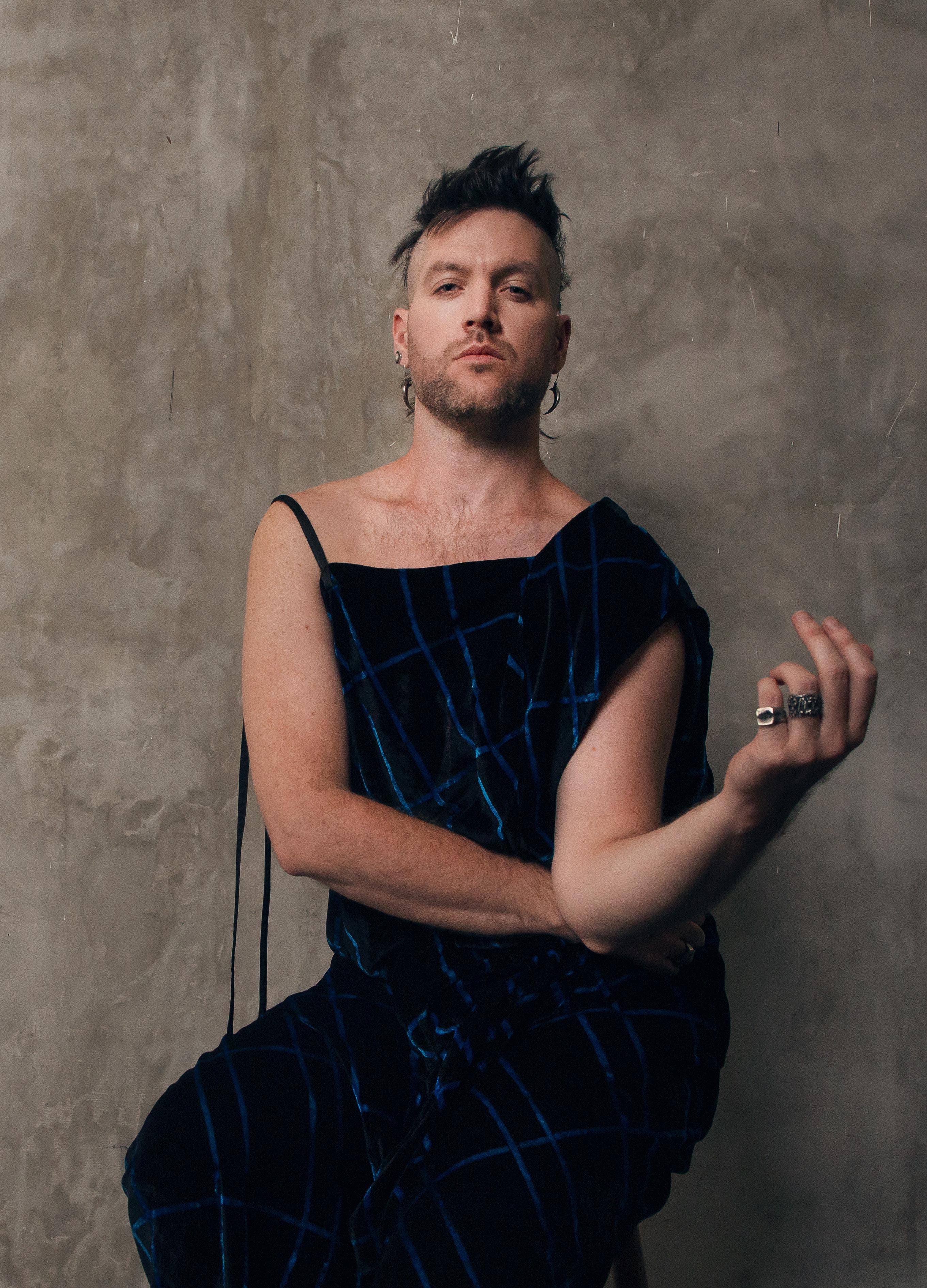
If you have anything you would like to share in future issues, get in touch using communications@otago.ac.nz
Ki Kia ora!
HOUSEKEEPING W/ OUSA PRESIDENT QUINTIN
Kia ora!
It’s getting colder in Dunedin, and I can only imagine your lives are getting busier as course work picks up, and study starts to feel very real once again. Now is the time to make sure you’re taking care of yourselves. Make sure you keep warm, eat proper meals, and don’t let yourself get too far behind! It’s harder to catch up than to keep on top of your work.
If you are struggling, pop in and see our amazing OUSA student support team on Ethel Benjamin Place, they’re here to help in every way you can imagine.
Every week Critic publishes a fun, easy recipe if you’re struggling for inspiration too!
Our annual Hyde Street party is coming up next month, and the Capping Show is well under way too. Make sure you check out our social media for all the ticketing details, you don’t want to miss out. Also, you may have heard, the University is engaging in a review of the languages and culture program. If you have any concerns or questions about this, OUSA will be hosting a drop in hui at 11am on April 5th. We’ll use this to inform our submissions to the university. We’re here to represent you, and want to know your thoughts. More broadly, we’re also recruiting for a bunch of our committees at the moment. These inform our policy and lobbying efforts, check out our Facebook and website for more details, and how to sign up!
Reach out anytime! (president@ousa.org.nz)
Quintin Jane
March In Review
THIS ISSUE:
> Hold On To Your friends run North Dunedin clean-up day
> Brent Paehua’s summer research into alternative protein and Māoridom
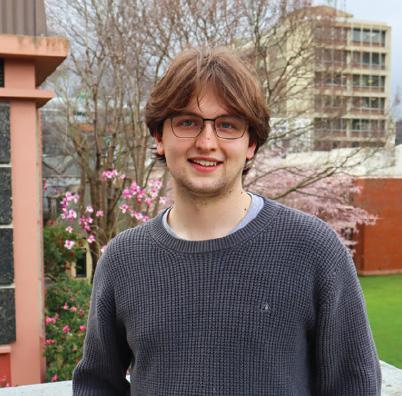
> Flâneur: Rosie Roaché’s Fringe show
> Tauira on the Te Matatini stage
> Tuakiritaka - the rebrand: Have your say
> Department of Anatomy embraces Ti Tiriti



> From the runway to the library
> Sustainability tips with Slow Food Youth
> Win free coffees!

2
Cover image by Tash Serena Meltsner. @tashserena
‘HOLD ON TO YOUR FRIENDS’ HOSTS NORTH DUNEDIN CLEAN-UP

A new student-led group aims to figure out what students can do to help work towards achieving the promises of the Sophia Charter and making Otago’s student culture safer, says a representative.
HOTYF felt at first that there was a disconnect between the large-scale infrastructural work being put into place by the University, and what tauira hear and understand about the message of the Charter.
In answer to this they came together to create an organisation which supports the message of the Charter, but is ‘by students, for students’. Hannah VanKampen runs the group with other Otago tauira Ben Prentice, Bede Brown, Louisa Mason and Niamh Orr Walker.
The first major event HOTYF was involved with was the annual North Dunedin Clean Up on Friday, 24 March.
The Clean Up aimed to support the Sophia Charter by promoting a respect for flats and the surrounding areas, on the understanding that clean flats are one crucial step towards safe flats.
THE BULLETIN PHOTO COMPETITION IS BACK!
The message that Hold On To Your Friends want tauira reading this to take away is that they’re not trying to stop the fun, they are just trying to make sure there is support for students who need it and that real progress is taking place to make student culture safer, says Hannah.
We’re excited to announce the launch of the 2023 Bulletin photo competition. This annual competition is a highlight in our calendar, and we’ve received some stunning entries over the years.

Whether shot on an iPhone or a fancy DSLR, shots of your pet or an epic sunset, we want to see them all! The winning photos will be featured in a series of ‘photo of the month’ posts across Otago’s social channels.
Entries open Monday, 3 April. Check out all the competition details here.
3 ” “
We are intent on making sure that as time passes the mahi to prevent any more tragedies from happening continues on the ground.
Brent Paehua reckons that if his dad, “a Māori guy born in the ‘50s”, can accidently buy alternative meat burgers and enjoy them, that shows how far research and development into alternative proteins has come.
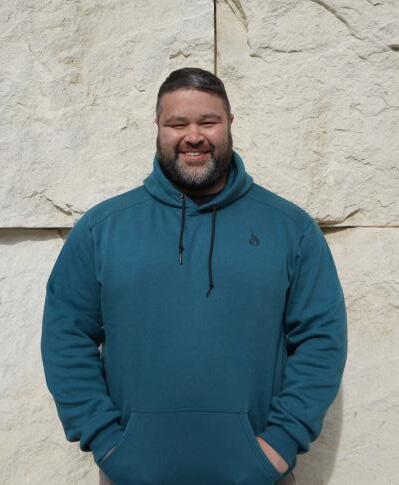
As part of the Summer Scholarship programme the Sociology and Criminology student spent his summer working from the Centre for Sustainability contributing towards ongoing research on the project Protein Futures: Future Scenarios for Land-Use in Aotearoa New Zealand. His mahi focused on examining the potential linking factors between Te Ao Māori and emergent alternative proteins. At first he thought the project might be too “sciency” for his interests, but once he started thinking about the social factors, and how they interact with the science, he was on board.
“There were a lot of different elements to the project, and I learnt a huge amount from the minutiae of alternative and emerging proteins to the cultural, social and economic factors which surround their consumption.
“I went from Joe Public with a pretty stereotypical view of alternative food products (plant based, alternative proteins), to someone who now struggles to avoid having difficult conversations about the climate impacts of the meat and dairy industries with my friends and whānau.”
Brent is not vegan though, and says he does not think there has to be an “all or nothing” approach to diet. He eats alternative protein alongside meat now, and avoids dairy, explaining that “moving away from what you’re taught a healthy diet looks like - meat and three vege - is a big part of rethinking protein consumption”.
Engaging Te Ao Māori in alternative proteins has until now focussed on the concept of kaitiakitanga.
Kaitiakitanga is the ethic or practice of protection and conservation of Aotearoa and its environment.
“Engaging Māori in alternative proteins requires much more than the suggestion of kaitiakitanga, it requires education, collaboration and an appreciation for Mātauranga Māori.”
Brent’s summer research suggests that engaging Te Ao Māori in alternative meat discourses should be more holistic in approach, combining different factors to explain why these new proteins could be beneficial.
“We don’t need to look at changing those cultural practises necessarily, we need to look at changing daily protein consumption. Although over the summer we did have a lot of tongue in cheek talks about how alternative meat would perform in hāngī or boil up.”
One “amazing” thing that came out of the project was the conversations he was able to have with his dad about his research.
“My dad grew up in the Kaitupeka Valley in Taumaranui, in a totally Māori community with no power and no running water, and I’ve got to admit at first, he was pretty sceptical of the idea of meat alternatives.
EXPLORING ALTERNATIVE MEATS AND TE AO MĀORI
“By the end of the project though, he really started to get on board. Maybe not with the changing of meat and three vege traditions so much - that might be a step too far - but with the social and environmental factors. His dad’s review was that “with enough sauce, you can’t notice much of a difference”.
Getting to have those long discussions with his dad allowed him to get to know his dad even better, which was a really special part of the project, says Brent.
4
“
”
By the end of the project though, my dad really started to get on board. Maybe not with the changing of meat and three vege traditions so much - that might be a step too far - but with the social and environmental factors.
ROSIE’S PHOTOS WIN AT THE FRINGE
“I am a jack of all trades, but hopefully not a master of none,” Rosie Roaché jokes, referring to her artistic skills, which include singing, theatre, photography, dance, and painting.
The Arts student won the Most Promising Pacific Artist Award at the Dunedin Fringe Festival this month with her candid photography exhibition: Flâneur.
Creative New Zealand sponsored the exhibition, and Rosie’s photographs were shown at the Dunedin Pride X Fringe Hub alongside Ma’taria Pepeko’s show Toku Inangaro I Taku Peu Māori, and Padma Naidu’s show Wandering Wonders Incensed.
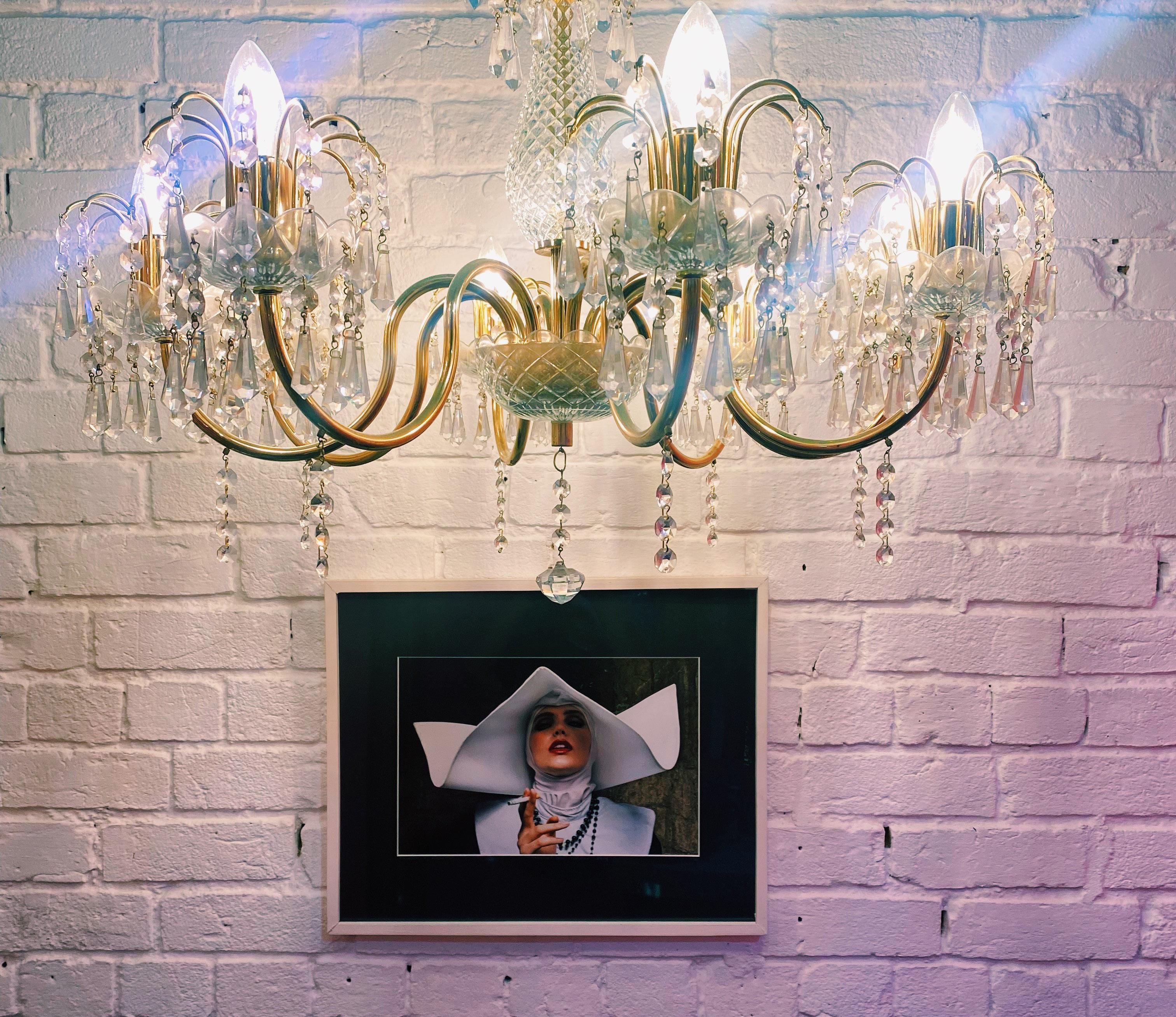
A flâneur is someone who wanders through a city observing society.
“I relate to the idea a lot because that’s what I felt like when I first moved to Dunedin from South Auckland,” says Rosie.
5
“ ”
I captioned it “Smoking nun stares back at drunk Christian girl” and people liked how raw that was, but I was mostly just trying to be funny.
TAUIRA REALISE DREAM ON TE MATATINI STAGE
University of Otago tauira took centre stage at Aotearoa’s most popular Te Matatini to date.

It has been a busy few months for Māori Health tauira Hineani Campbell-Collier (Te Whānau-a-Apanui, Te Whakatōhea, Te Aitanga-a-Māhaki, Ngāi Tahu) and Music and Māori studies tauira Tomuri Spicer (Ngāpuhi, Ngāti Maniapoto, Ngāti Raukawa), who both performed at Te Matatini 2023.
The event is a celebration of kapa haka, bringing iwi from around the country together to compete and be crowned the best kapa in Aotearoa.
Hineani performed with Te Whānau ā Apanui, this year’s competition winners, and Tomuri stood with Te Poutūmārō. She says “the vibe was electric” at the competition after four years of cancellations due to the pandemic.
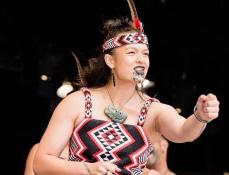
Hineani says the experience of watching herself on stage at Te Matatini was something she “couldn’t even put into words”.
“It’s so buzzy, I’m watching myself on TV performing in my dream team.”
For Tomuri, kapa haka has always been his “way to be Māori” in a “South Island rural farmie town. Kapa haka was the extent of my reo and ao Māori.
“Being Māori wasn’t something I fully understood, and so kapa haka was my way to recognise and acknowledge that part of my whakapapa, of my family history. It was a chance for me to grow as a tangata whenua, as a person of this land.”
“I’ve been to past Matatini’s and I feel like this one was on another level.” Tomuri grew up in the small South Island town of Cheviot and says he was “fizzing” to witness the display of culture present at Te Matatini, his first national kapa haka competition.
Tō Tātou Tuakiritaka | Pride in our identity
Both tauira are grateful to their whānau for supporting their journey to Te Matatini and are looking forward to a positive year ahead.
Have you filled in the Tuakiritaka survey? A proposal for a new University logo was released on 15 March , and the University wants to hear from students about it. Check your emails for the opportunity to have your say on the proposal. A personalised link to a survey has been sent to all students via their University email address. It will come from noreply@qemailserver.com so please keep an eye out for it and check your different folders in case your server decides it is junk/spam.
Your opinion matters!
6 ” “
I’ve never really been up North for longer than a few days before, so to go to Tāmaki Makaurau and just see that Matatini culture for the first time, it was nuts.
DEPARTMENT OF ANATOMY EMBRACES TE TIRITI
The importance of acknowledging and accepting Tiriti-partnership is a key motivation in Te Tari Kikokiko (Department of Anatomy).
Changes include the requirement for all undergraduates to complete a Māori-focused paper as part of their Anatomy major subject requirements, which the department feels will equip students with cultural competency and knowledge.
Head of Department, Professor Christine Jasoni says her goal when she started was to move confidently in the direction of being Te Tiriti-led and responding to the goals of the University's Māori Strategic Framework.
“To assert the importance of co-leadership and partnership we created the position of Deputy Head of Department Māori, appointing Professor Louise Parr-Brownlie (Ngāti Maniapoto, Te Arawa).
“The department is fortunate enough to have various Māori subcommittees including Māori ki Anatomy, Rōpū te mea Māori and the Anatomy Māori and Pacific Tauira Support Network.
“These act as forums for staff and tauira to influence and advance Te Tari Kikokiko within te ao Māori.
“The tautoko from Departments and Centres throughout the University who teach Māori-focused content, including Te Tumu, Kōhatu, and the Departments of Physical Education and Public Health, has been huge when it comes to providing resources.“
There are many motivators for the American-raised Professor Jasoni, but empowering Māori to thrive in spaces where Māori students have been disadvantaged is key.
“Our educational systems have traditionally disadvantaged Māori for many reasons. I believe strongly that Māori should not have to stop being Māori in order to be successful in our university system and in their careers beyond university.”
“It’s about creating a learning environment where Māori staff and students feel safe and can pursue their learning and academic aspirations in a culturally relevant and supportive environment without feeling pressure to change who they are in order to be successful.
“That meaningful rather than transactional relationships between Māori and non-Māori eventuate in our teaching and research practice.
“One of our new initiatives, which I am quite excited about is a ‘grow-our-own’ succession plan to bring Māori and Pacific students through postgraduate study and into becoming academic staff in our department.”
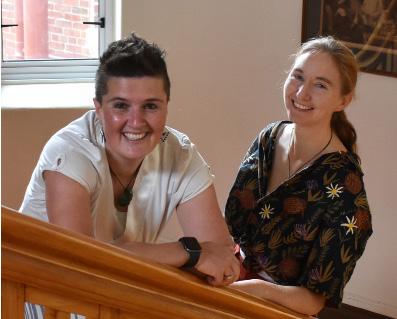
7 “ ”
Subcommittee Rōpū co-leaders Dr Alana Alexander (Ngāpuhi: Te Hikutu, Pākehā), left, and Dr Charlotte King are providing support within the department.
There is a poor understanding of what equity means as well as the fear of the unknown. Over the year, buy-in has increased as people became more comfortable, mainly with tikanga and using te reo Māori.
JOURNEY FROM THE RUNWAY TO THE LIBRARY
A multi-award-winning non-binary fashion designer is taking a moment away from their avant-garde clothing line to try something new at Otago.

Mark Baigent says being accepted into the University’s undergraduate degree in Gender Studies has given them a second chance they are overwhelmed to receive.
“Where I grew up (Austria), it wouldn’t be possible for me to return to academia as a mature student, even after such a successful fifteen-year career, all because I didn’t graduate from high school,” they explain.
Mark found the education system they came from was prescriptive, and they struggled to find their place.
They decided instead to pursue what has become a globally successful career in the fashion industry, spanning over a decade and including both modelling and designing gender-fluid collections under their label ‘Mark Baigent’.
Despite their success, however, their desire to contribute to research on social issues about gender never dissipated.
“When I finally felt ready to try and come back into education, I looked at Gender Studies programmes all over Australasia, and people kept pointing me to Otago.”
The Gender Studies Department at Otago prides itself in teaching students to “think broadly critically and creatively” and “appreciate diverse points of view” outlines the department’s website.
“Being recognised by an institution like Otago, who looked at my accomplishments, not my grades, is something I could never have imagined.
They also feel thankful there is an institution that allows people from unconventional academic backgrounds to study.
“An institution that gives us a second chance in a way.”
Since arriving, Mark, who was also awarded an Achievement Scholarship, says they have been overwhelmed by the approach of professors and the respect staff give to students at Otago.
“It’s what a person like me needed.
“I left school and said ‘I will never step into academia again’, it was too traumatic, but now I am here.”
They intend to apply for a PhD after graduation, as they particularly want to contribute academically to the endeavour of giving a voice to the “minority within a minority”, whom they perceive to be trans and intersex folks.
The way they run their eponymous fashion brand demonstrates that they “practice what they preach” regarding equality and intersectionality, they say.
“We mostly employ single mothers in our factories, and we put in the mahi to go above and beyond to help them to support themselves and their families. We think it’s crucial.”
Mark Baigent the brand is also in the process of becoming Fair Trade certified. To read more about Mark’s clothing line and story head to their Blog or follow them on Instagram.
8
” “
Mark Baigent photographed by Tash Serena Meltsner
I am walking the halls of this University emotional every day. I feel privileged that Otago has welcomed me with open arms, despite my unconventional academic background.
SUSTAINABILY TIPS W/ Slow Food Youth Otago
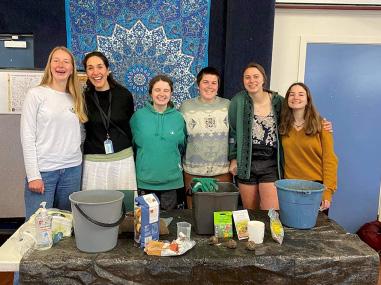
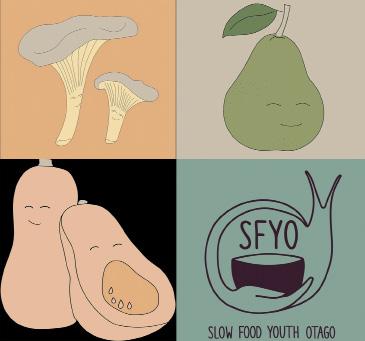
> Know the difference between ‘Use by’ and ‘Best before’ date - while you cannot eat food after the ‘Use by’ date, food past the ‘Best before date is still good to eat!
> Commit to one night a week to eat up what is left in the fridge - there are lots of recipes online to use up your leftovers.
> Start composting! If you don’t have a compost bin, you can drop off your food scraps at the SEA communal garden (check out their socials for more info).
> Learn how to portion correctly to eliminate food waste - a bit of planning can save you a lot!
> Meal plan! This allows you to shop more efficiently and avoid buying things you won’t end up needing.
> Create an “Eat me first” section in your flat’s fridge or pantry, and if all fails, freeze food for later!
> Sharing is caring - if you can’t eat it, give it away to friends or neighbors who might.
KAWHE ON US?
To celebrate our baby baristas from across the campus completing ‘barista bootcamp’ training we are collaborating with St David cafe. They will give a free coffee of your choice to the first ten tauira to mention ‘Barista bootcamp’ to the person serving them at the cafe. Then just say the password ‘bootcamp’.
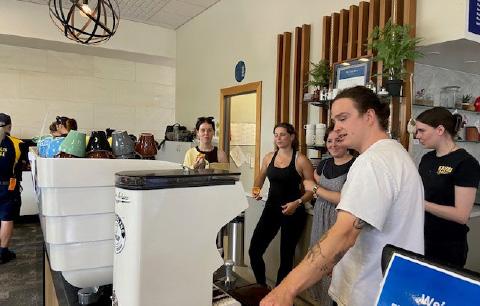
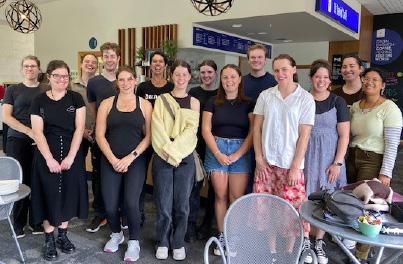
9
MĀEHE WHAKAAHUA


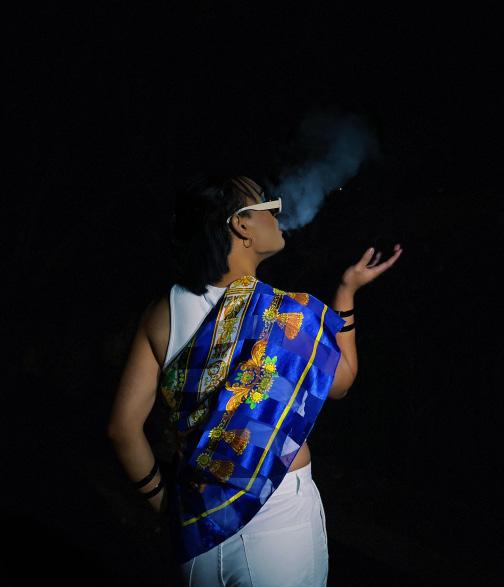

Want to see your pics in next month’s photo dump? Send them to: communications@otago.ac.nz
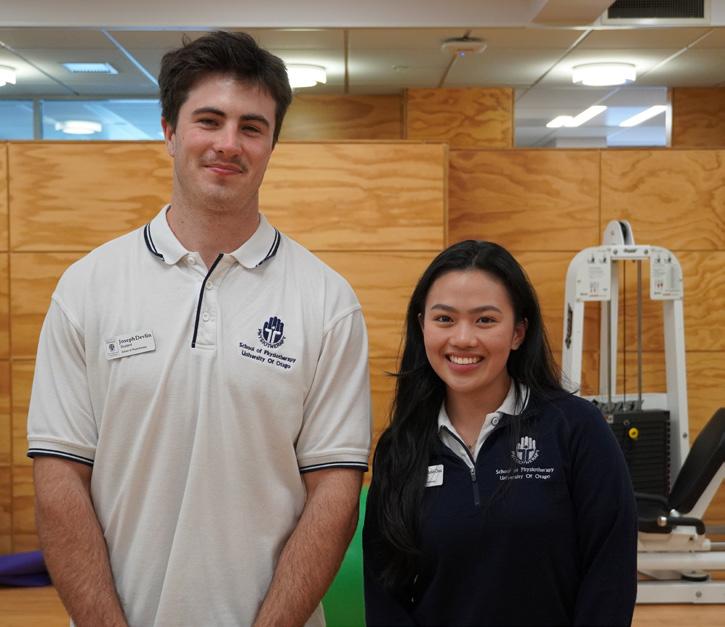

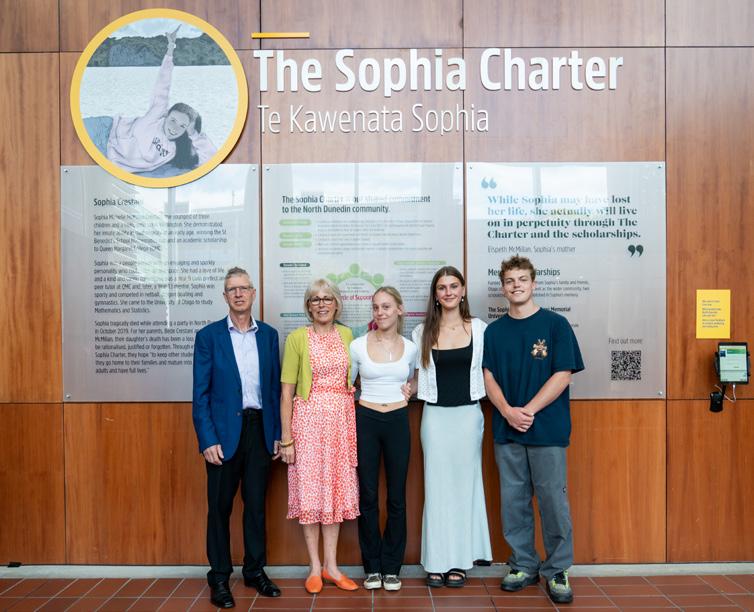
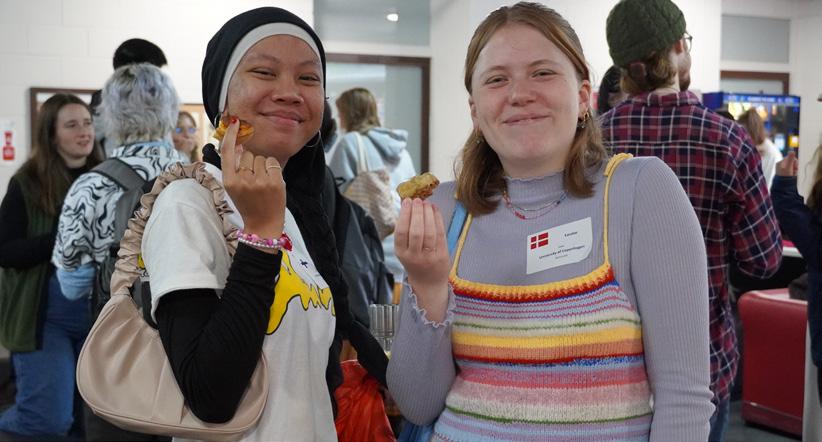
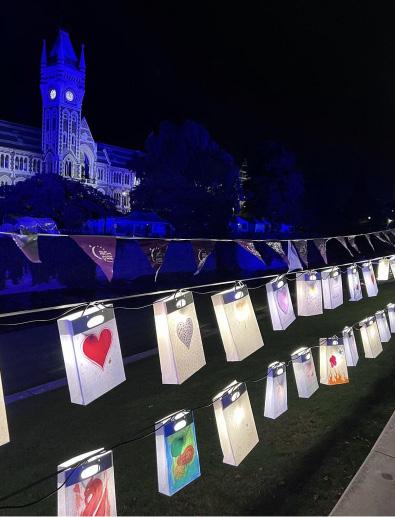
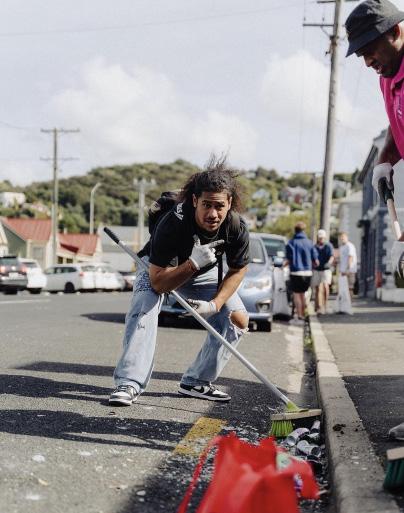 Students sharing kai and chats at the Exchange mixer held in March.
The North Dunedin street clean-up.
Photo by @jaytaylee
Hineani Campbell-Collier (Te Whānaua-Apanui, Te Whakatōhea, Te Aitanga-a-Māhaki, Ngāi Tahu) backstage at Te Matatini with her parents and niece.
Beautiful candle bags made by the participants of the Student Relay for Life, organised by CancerCore.
Photograph from Otago Tauira Rosie Roaché’s exhibition ‘Flâneur’ held at the Dunedin Fringe.
Sophia Crestani’s parents and hoa at the unveiling of the Sophia Charter display.
Tomuri Spicer backstage at Te Matatini.
Hannah VanKampen with the Hold On To Your Friends sign.
Student physios who have just finished their clinic rotation.
Mark Baigent’s gender neutral clothing line.
Students sharing kai and chats at the Exchange mixer held in March.
The North Dunedin street clean-up.
Photo by @jaytaylee
Hineani Campbell-Collier (Te Whānaua-Apanui, Te Whakatōhea, Te Aitanga-a-Māhaki, Ngāi Tahu) backstage at Te Matatini with her parents and niece.
Beautiful candle bags made by the participants of the Student Relay for Life, organised by CancerCore.
Photograph from Otago Tauira Rosie Roaché’s exhibition ‘Flâneur’ held at the Dunedin Fringe.
Sophia Crestani’s parents and hoa at the unveiling of the Sophia Charter display.
Tomuri Spicer backstage at Te Matatini.
Hannah VanKampen with the Hold On To Your Friends sign.
Student physios who have just finished their clinic rotation.
Mark Baigent’s gender neutral clothing line.




11




























 Students sharing kai and chats at the Exchange mixer held in March.
The North Dunedin street clean-up.
Photo by @jaytaylee
Hineani Campbell-Collier (Te Whānaua-Apanui, Te Whakatōhea, Te Aitanga-a-Māhaki, Ngāi Tahu) backstage at Te Matatini with her parents and niece.
Beautiful candle bags made by the participants of the Student Relay for Life, organised by CancerCore.
Photograph from Otago Tauira Rosie Roaché’s exhibition ‘Flâneur’ held at the Dunedin Fringe.
Sophia Crestani’s parents and hoa at the unveiling of the Sophia Charter display.
Tomuri Spicer backstage at Te Matatini.
Hannah VanKampen with the Hold On To Your Friends sign.
Student physios who have just finished their clinic rotation.
Mark Baigent’s gender neutral clothing line.
Students sharing kai and chats at the Exchange mixer held in March.
The North Dunedin street clean-up.
Photo by @jaytaylee
Hineani Campbell-Collier (Te Whānaua-Apanui, Te Whakatōhea, Te Aitanga-a-Māhaki, Ngāi Tahu) backstage at Te Matatini with her parents and niece.
Beautiful candle bags made by the participants of the Student Relay for Life, organised by CancerCore.
Photograph from Otago Tauira Rosie Roaché’s exhibition ‘Flâneur’ held at the Dunedin Fringe.
Sophia Crestani’s parents and hoa at the unveiling of the Sophia Charter display.
Tomuri Spicer backstage at Te Matatini.
Hannah VanKampen with the Hold On To Your Friends sign.
Student physios who have just finished their clinic rotation.
Mark Baigent’s gender neutral clothing line.
